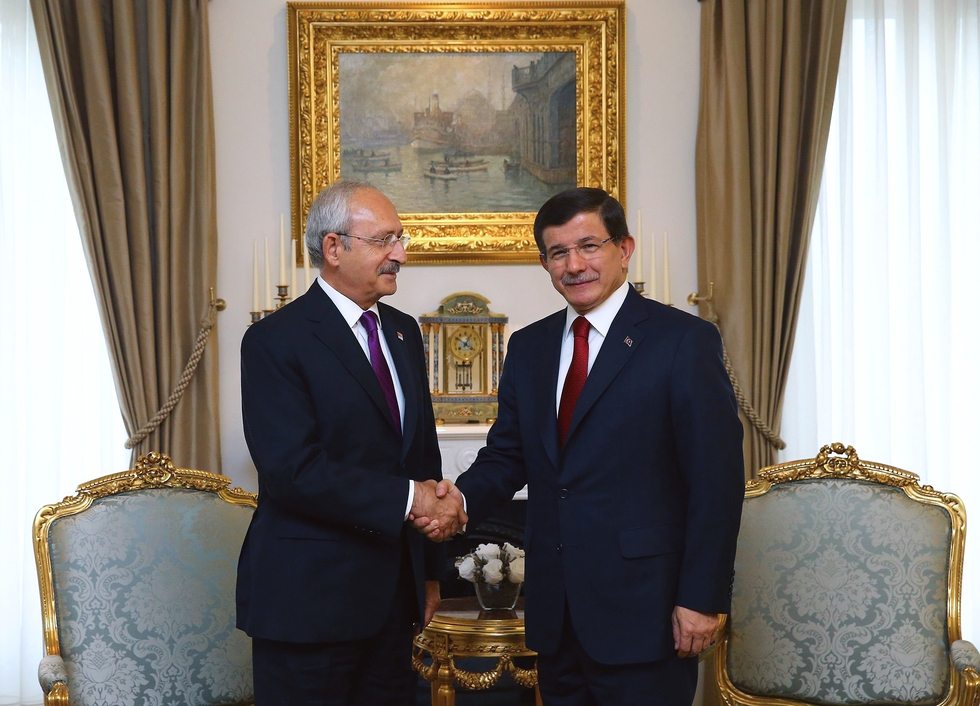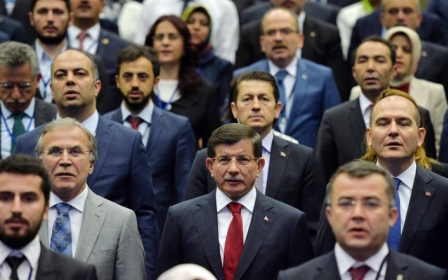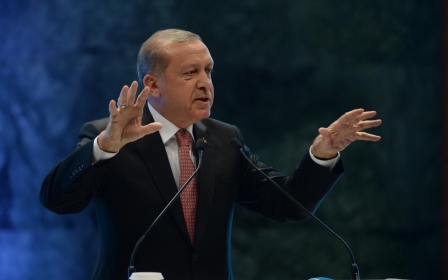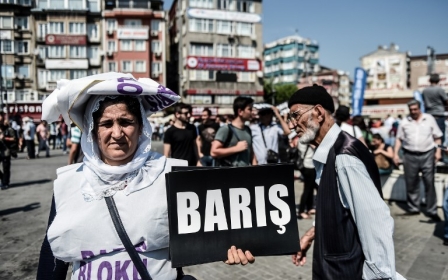
Turkey needs to build a new political centre
Turkey's 7 June elections produced a political picture in which the mainstream parties lost blood while the identity-focused, "protest" parties gained in strength. The governing conservative Justice and Development Party (AKP) saw its share of votes fall by nine percentage points compared with the result of the 2011 general election. It went from approximately 50 percent to 41 percent of the votes.
Though slight, the main opposition, secularist Republican People's Party (CHP) also saw some modicum of decline in its vote. In contrast, the representatives of Turkish and Kurdish nationalism increased their share of votes. Though this increase was moderate for the Turkish Nationalist Movement Party (MHP), it was spectacular for the pro-Kurdish Peoples’ Democratic Party (HDP), which more than doubled its share of the vote. Pro-Kurdish parties have traditionally hovered around 6.5 percent, but the HDP received over 13 percent of the vote in the 7 June election.
Though the HDP rejects the label of Kurdish nationalism, instead striving to portray itself as a left-liberal party, it still can't escape the adjective of Kurdish-nationalist. Despite the left-liberal flavour, the vast majority of the voters who cast their votes for the HDP were Kurds. And demands and aspirations related to the Kurdish issue and nationalism were some of the primary factors that led people to throw their support behind the HDP. This picture is in line with a political trend that has been underway for some time in Turkey. Turkish politics is being consolidated along two axes: ethnic and religious lines. And this consolidation is very much related to Turkey’s founding ideology and the identity of the state, which was an amalgamation of secularism, Turkish nationalism, and a Western orientation.
Turkey’s identity-focused politics
As a corollary to this state identity, Islamism was seen as the antithesis of secularism, the Kurdish identity as a threat to the Turkish identity of the state, and the Middle East as the geography of both this ideology and identity was set against the country’s Western orientation. Hence Islamism as an ideology, Kurdishness as an identity, and the Middle East as a geography were securitised.
This reading formed the crux of Turkey’s now largely defunct official Kemalist ideology and the boundaries of its previous political centre. This notion of Turkish identity created winners and losers. On the religious criteria, while the secularists embraced this notion, the Islamists and conservatives were victimised by it.
Likewise, on the ethnic criteria, while the Turkish nationalists whole-heartedly supported this ideology, the Kurds fell victim to it, and hence strongly resisted and rejected it. In the present day, the Islamist and conservative section of society forms the social base of the AKP, while the secularist segment forms the CHP’s. Likewise, the sections of society that see their primary reference of identity through ethnicity vote for either the MHP or HDP. Over the last decade, this picture has been consolidated. Political space has become an arena for conflicting identity demands, thus forming a political centre has proved to be an uphill battle.
Turkey’s Kemalist political centre
Historically, the Turkish political centre was formed around a centre right and centre left. The trouble with this setting was that this centre was not very democratic and did not reflect the primacy of democratic politics. The political centre represented a division of labour between elected and unelected forces, the military and elites of the civilian bureaucracy, within the system. In this hierarchy of power, the unelected forces had primacy over the elected ones. This is more or less how the system functioned since the advent of the multi-party system in Turkey (nominally in 1946 but more realistically in 1950, as Turkey's first purported competitive election in 1946 was conducted with an open voting and closed counting system).
In this setting, the centre-right and -left parties weren’t only inferior to the civil-military tutelary regime, but they also functioned as a bulwark against identity and ideology-focused demands stemming from the political, ideological and identity periphery of the system. They prioritised a developmentalist agenda over a democratising one, and remained largely unresponsive to people’s identity- and ideology-focused demands. While the centre left attempted to absorb and stifle the political dynamism and demands of socialist, far-left parties in the 1960s and 1970s, the centre right played the same role to the religious right, Islamist and nationalist parties starting from late 1960s onward.
When this system faced a challenge and proved dysfunctional, the military intervened. Turkey's military interventions and coups in 1960, 1971, 1980, and 1997 all served the same purpose: to preserve the political centre as conceived by the military-led Kemalist elite. Yet, this system proved almost utterly dysfunctional in the face of a growing tide of democratisation worldwide as the result of the end of the Cold War and the ensuing dissemination of democratic waves which arrived at the shores of the majority of humanity for the first time, increasing the prominence and assertiveness of the identity-focused parties, which demanded further democratisation, rights and liberties in the 1990s. Islamism and Kurdish and Turkish nationalism were all on the rise.
The crisis of the political centre
The rise of Islamist and Kurdish politics were particularly problematic for the system, as it cast any demands on behalf of political Islam and the Kurds into the language of national security. They were seen as existential threats to the system. Yet the system's perception of such threats was only aggravated by the Islamist Welfare Party (Refah Party) which was swept into power in the 1995 elections. This victory was preceded by the Refah Party’s major victory in the 1994 local elections, in which the party won both the Istanbul and Ankara municipalities.
In addition, as the fight between Turkey and the Kurdistan Workers' Party (PKK) reached a climax, the first Kurdish political party, the People’s Labour Party (HEP) came into being in 1990. These developments shook the foundation of Turkey’s political establishment, centre and official ideology. The state responded to this challenge by steering yet another coup, which was dubbed the 28 February Process, in 1997, to topple the Refah Party-led coalition government. This only aggravated the crisis of the political centre, elites and official ideology. The legitimacy of the state and official ideology were at stake. So was the legitimacy of the political centre, formed around centre-right and -left parties, as people clearly saw that the elected component of the political centre bowed to the unelected ones and were unable to represent their identity-driven, ideological demands.
The search for a new political centre
Though the old political centre shattered in the 1990s, a new political centre had to wait and in fact is yet to completely emerge to replace the old one. The AKP, which came into power in 2002, has deconstructed the old political centre and establishment, but hasn't introduced a new one. Among other factors, the struggle between the AKP and the military-bureaucratic alliance, and the belief among the supporters of the previous political establishment that the old system can be revitalised, have proved particularly inimical to the establishment of a new political centre. This fight and view lasted by and large until 2010-2011. Unfortunately, other civilian political components, and particularly the secularist CHP, threw their weight behind these undemocratic forces, which, coupled with other factors, rendered the task of establishing a new political centre unachievable. In the end, the establishment of such a centre required at least the tacit support of other major political parties.
In this respect, the election of 2011 was an opportunity for the establishment of a new political centre, as it decisively represented a victory for the AKP. The party won almost 50 percent of the vote, spelling defeat for the military-led tutelage regime. It became clear that there was no way to bring back the previous system. The firm demise of the old system should have paved the way for the construction of a new one, at least theoretically, but none has yet emerged.
The contest to define Turkey
Unfortunately, Turkey has instead experienced fierce competition between various societal and political groups to redefine the country’s socio-political-ideological contours since 2011. As the military was pushed back to its barracks and the undue influence and power of the bureaucratic tutelary regime was curtailed, politics has become the only game in town to shape the country’s future. Since the establishment of modern Turkey, one can even stretch this back to the later period of the Ottoman Empire: for the first time Turkey's public and political space would have been defined by civilians through democratic politics.
Lacking a culture of compromise and consensus, and politicised along lines of identity, all socio-political groups felt they had too much at stake. Given the AKP's political dominance - for the first time the presidency, the prime ministry and all the seats in the cabinet were occupied by figures from the same political tradition - the secularist opposition was particularly fearful of this new period. Devoid of its previous, though undemocratic, political safety net - the military-civilian high bureaucracy - and unable to construct a formidable political force and mount a political challenge to the governing AKP dominance, secularists felt more and more unrepresented in the political system. The party that received the vast majority of their votes, the CHP, proved moribund and inept, and hence unable to represent their demands and aspirations in the political sphere.
The dysfunctional nature of conventional politics, coupled with the AKP's strong emphasis on themes of identity, coupled with then-prime minister now-President Recep Tayyip Erdogan's strong language, gave way to street politics. Though conjectural factors such as Erdogan's language, the excessive use of police violence and the lack of any intermediary mechanism accounted for the anger that broke out during the Gezi Park protests, these conjectural factors do not account for the anger that was accumulated over the years and which finally broke out during these protests. These aforementioned structural factors formed the true background to these protests.
As the country became further polarised, especially at the political level, the formation of a new political centre proved formidable, because all the political calculations at this time were geared towards the three consecutive elections that took place between 2014 and 2015. These elections were seen as crucial turning points in the reshaping of Turkey. While the political tension reached its climax right before the first round of these three elections - the 30 March 2014 local election - it then progressively decreased. In fact, political tension and polarisation were relatively low in advance of the 7 June 2015 general elections.
The political picture expected to emerge after these three elections became clearer, and some of the fears of the opposition proved either unachievable - such as the changing of the political system to an executive presidency - or else unfounded political tension decreased. The fact that the CHP had to give up on its secularist themes and problematisation of religious liberties, and instead engaged in extensive talks with the AKP for the formation of a coalition government, testifies to this. This provides Turkey with an opportunity that the political class should seize upon.
The danger facing Turkey’s contemporary politics
Despite this amenable context, there are some other trends that bode ill for the construction of a new political centre. Besides its undemocratic nature, two of the primary deficiencies of the previous political system were its suppression of identity- and ideology-based groups - whether Kurds, Islamists or socialists - and its disregard for the demands of these identity groups. But Turkey’s contemporary politics now face a new type of danger: being overwhelmed by identity groups, rendering the political system and centre a patchwork of identity groups rather than a coherent political community,
While the partial liberation of the previously securitised and suppressed identities is a welcome development, Turkey faces the danger of becoming hostage to identity politics, rendering other social and political topics secondary in role and importance to this overarching theme. The danger of creating isolated identity politics – prisons - is real and palpable. A look at contemporary Iraq and Syria or yesterday's crumbling Yugoslovia and Bosnia-Herzegovina is sufficient to comprehend the danger posed by having a society divided along ethnic, sectarian and religious boundaries. It attenuates national identity and ushers in contending ethnic-religious-sectarian claims for loyalty. For instance, the significance and importance of being Iraqi or Syrian unfortunately pales when compared with the importance attached with being Shia, Sunni or Kurdish. The non-existence of an overarching political identity is one of the major root-causes of these countries' ills. The creation of such isolated identity prisons in any polity is inimical to creating a political, civic community that goes beyond and cuts across religious, ethnic and sectarian identities and loyalties.
Another danger is that the reinitiation of the fight between the PKK and Turkey has the potential to push Turkey back on its de-securitisation of previously securitised identities. Though not the only issue, the Kurdish issue is the primary candidate for becoming re-securitised. No other party has fought as hard as the AKP to de-securitise the Kurdish and Islamist identities; hence it should be careful to not to squander one of its major successes. Instead, it should further press forward with its policy of the de-securitisation of identities, this time particularly aiming at Turkey’s Alevi community, a minority religious group.
All in all, despite some menacing trends, Turkey more or less has all the attributes for the formation of a new political centre: the belief in the terminal demise of the previous Kemalist political system and centre, the growing recognition that there can be no going back on recognising the rights and liberties of the Islamists and Kurds, a growing awareness among the secularist opposition that they can rely on no one but the people to shape the public and political sphere as they are unlikely to muster enough power from undemocratic forces in the military-civilian high bureaucracy to become a significant political player. However, the creation of a new political centre requires some level of compromise and consensus among different political groups to turn it into reality.
The political elite should grab this opportunity to construct a new political centre in earnest after the 1 November repeat elections; the alternative to this is political instability and uncertainty engulfing Turkey for some years to come.
- Galip Dalay works as a research director at al-Sharq Forum and senior associate fellow on Turkey and Kurdish Affairs at Al Jazeera Centre for Studies.
The views expressed in this article belong to the author and do not necessarily reflect the editorial policy of Middle East Eye.
Photo: Prime Minister and Justice and Development Party leader Ahmet Davutoglu shakes hands with Republican People's Party leader Kemal Kilicdaroglu (AFP)
New MEE newsletter: Jerusalem Dispatch
Sign up to get the latest insights and analysis on Israel-Palestine, alongside Turkey Unpacked and other MEE newsletters
Middle East Eye delivers independent and unrivalled coverage and analysis of the Middle East, North Africa and beyond. To learn more about republishing this content and the associated fees, please fill out this form. More about MEE can be found here.




